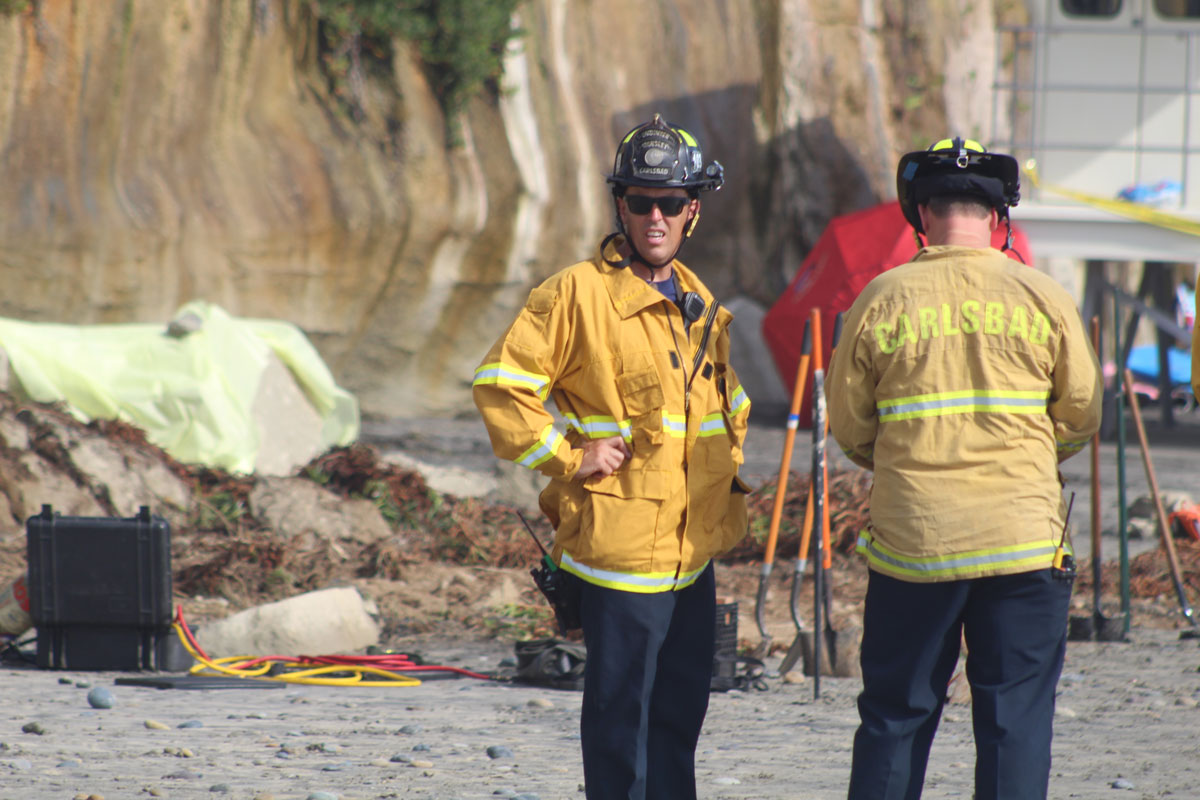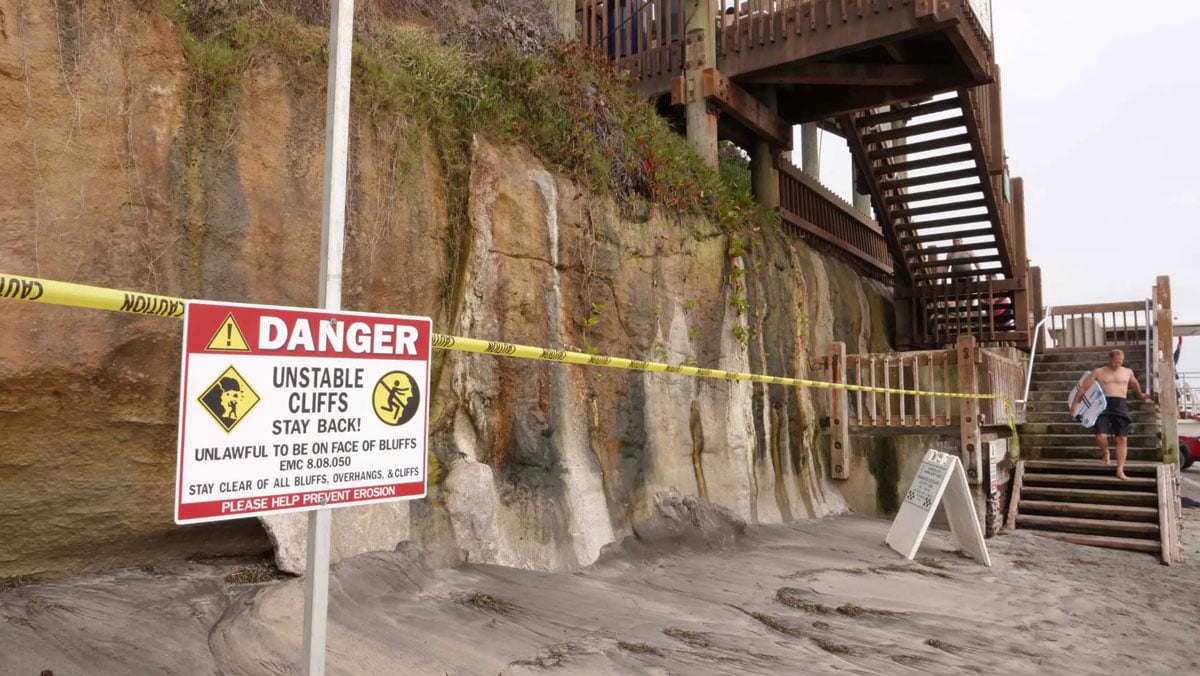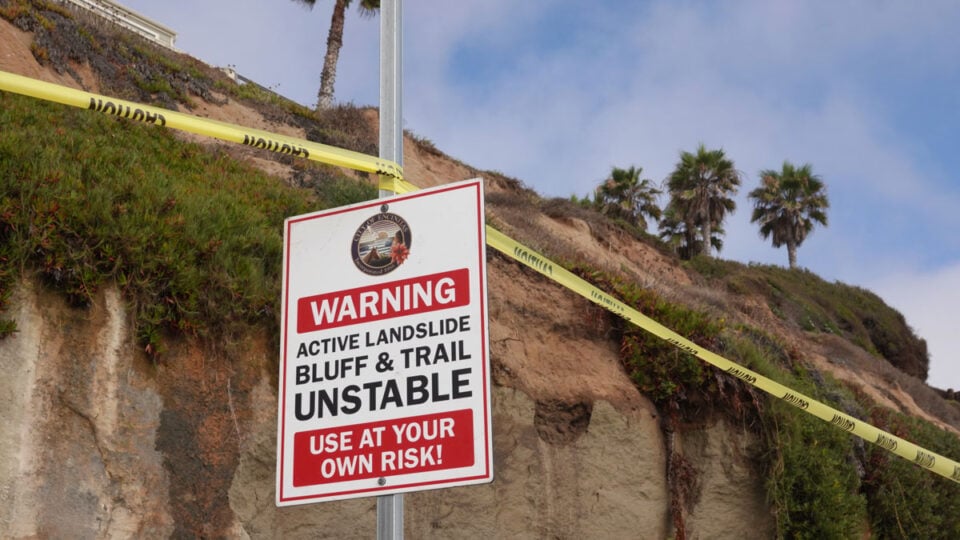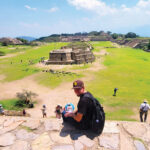Four years after a multi-ton chunk of sandstone toppled onto Grandview Beach and killed three women, a family’s wrongful death lawsuit has survived multiple attempts to have the case dismissed and continues its slow march toward trial.
The lawsuit, filed against the city of Encinitas, the State of California, Leucadia Seabluffe Village Community Association and Seabreeze Management Company, alleges years of negligence and dangerous property conditions played a role in the deaths of Encinitas residents Julie Davis, 65, her 35-year-old daughter Anne Clave, and Davis’ 62-year-old sister Elizabeth Charles of San Francisco.
The women were killed after a 30-foot slab of clastic rock broke loose from a seaside cliff and landed on their family gathering on Aug. 2, 2019, at Grandview Beach.
The Davis family filed a complaint one year later, claiming that decades of “poor storm drain management and irrigation” from nearby Leucadia Seabluffe Village cliff-top condos and the city’s failure to adequately maintain the bluffs severely weakened the sandstone escarpment.
Family members also expressed concerns that beachgoers continue to hang out near the fragile bluff walls, seemingly unabated since the deadly collapse.
“The fourth anniversary of Julie, Annie, and Elizabeth’s death has been difficult,” Pat Davis said in a statement to The Coast News. “With every year that passes comes another wave of heartache as we watch yet another year come and go without safety changes. Families still unknowingly sit in harms way while the City of Encinitas fails to act. We enter this upcoming year hoping that this is the year for change, and not more tragedy, that this is the year we can say, ‘These women did not die in vain.’”

Since the lawsuit was filed in 2020, each of the four defendants has filed motions for summary judgment — a request to end the case without a trial — seeking to dismiss the case. In January 2021, the judge sided with the Davis family, tossing out the city and state’s “natural condition immunity” argument.
Last year, the city filed a motion for summary judgment alleging the family’s original attorney did not meet statutory guidelines when initially filing claims with the city. However, the claims were mistakenly sent to the city’s risk manager after a municipal employee gave their attorney the incorrect filing information.
Attorneys for the city argued for the case to be dismissed since the “plaintiffs failed to comply” with state law by delivering the claims to the wrong department. The judge denied the city’s motion, citing a previous ruling that “[t]he city cannot frustrate plaintiff’s attempt to comply with a statute enacted for its benefit and then assert noncompliance as a defense.”
Most recently, Superior Court Judge Ronald Frazier denied another request to have the case thrown out, rejecting a Leucadia homeowners association’s argument that California law gives immunity to landowners for injuries sustained by recreational users on their property.
In July, the judge ruled that Leucadia Seabluffe Village could not definitively show the women were killed while on its property, a prerequisite for a successful recreational immunity defense.
The next hearing will be for Seabreeze Management Company’s motion to dismiss the case at 1:30 p.m. on Sept. 8 in Vista.
Bibi Fell, lead attorney for the Davis family, told The Coast News she is hopeful about the case making it to trial.
“I feel good about the case. We’re taught in law school for every wrong there is a remedy and I’ve always believed that about this case,” Fell said. “This was a very preventable tragedy and the information we’ve been getting in discovery just makes that more apparent.”
‘A recipe for disaster’
According to the lawsuit, city and state officials have long acknowledged the unstable bluffs at Grandview, a north access point to Leucadia State Beach. A landslide destroyed the Grandview staircase in 1983, and there was no public access for years.
In 1984, the state’s General Plan outlined the unique features that made the bluff unstable, including heavily-developed bluffs overlooking a narrow strip of beach, waterlogged invasive ice plants (or sea fig) carpeting the cliffs, and erosion related to irrigation and groundwater seepage from the nearby condominium townhouse community.
In a 20-year operating agreement between the city of Encinitas and the California Department of Parks and Recreation, the city was authorized to “develop, operate, control, and maintain” Grandview in a safe condition and provide lifeguard services, according to the lawsuit. As part of the agreement, the state reportedly agreed to inspect the beach and perform any maintenance or repairs for the city necessary to maintain safety.

In January 1988, the city hired Woodward-Clyde Consultants to conduct a geotechnical investigation to help evaluate the property and location for a new public stairway at Grandview. Woodward-Clyde’s report found several weaknesses in the cliff area, including widespread groundwater seepage that weakened the sandstone cliff, causing erosion and block falls.
The consultants advised installing at least 80 feet of rock bolts to strengthen the damaged cliff and a concrete seawall to conceal them. However, the lawsuit alleges that only 35 feet of rock bolts and seawall were installed when the public stairs were built, leaving a large area of the cliffs unprotected.
The complaint also notes the city sought to install 10 palm trees and eight drains for irrigation along the walkway leading to the stairs. As part of granting this request, the state reportedly set several conditions, including removing non-native ice plants and revegetating the bluffs with drought-tolerant native plants.
According to the attorney for the Davis family, none of the conditions were met. Today, the bluff at Grandview is covered in ice plants despite the city’s municipal code stating that “landscaping on beach bluff properties shall avoid the use of ice plant…to minimize irrigation requirements and reduce potential slide hazards due to over-watering.”
“Ice plants suck up all the water and become very heavy, like a water balloon with incredible weight pulling the bluff downward,” Fell said. “It’s a recipe for disaster.”
Bluff instability and the potential for collapse are nothing new for coastal residents. Since the fatal Grandview failure, several other landslides have temporarily shut down North County beaches.
Earlier this year, a bluff collapsed at San Elijo State Beach. In May 2022, a minor bluff failure forced the Beacon’s Beach parking lot and switchback trail to be closed for nearly two months. In February 2021, a portion of the bluff near a stretch of railroad tracks in Del Mar crumbled to the beach below. On New Year’s Eve in 2020, a bluff collapsed at Torrey Pines State Beach.
No injuries were reported during any of these incidents.
Collapse
According to the complaint and media reports, on the afternoon of Aug. 2, 2019, members of the Davis family met at Grandview Beach to celebrate Charles’ recent recovery from breast cancer. One of the victims, Clave, asked lifeguards where the family should set up on the beach, and the group was directed to set up underneath the cliff, the lawsuit states.
At approximately 2:53 p.m., a portion of the cliff collapsed onto the Davis family, burying several members under heavy sandstone blocks.
Pat Davis, husband of victim Julie Davis, could not lift the rocks off his wife and “dug a hole in the sand around her head to enable her to breathe,” per the lawsuit. The father then went to where his youngest daughter, Clave, was and held her head in his lap while waiting for paramedics to arrive.

Clave, seated near her two young children when the collapse occurred, was extricated from the pile by first responders and later died in the hospital from severe blunt-force head trauma. Julie Davis was ultimately pulled from the heap and transported to the hospital, where she later succumbed to her injuries.
Charles, sitting next to her 18-year-old daughter, was killed after heavy sandstone boulders fragmented her body, parts of which were never found, according to the complaint.
All of the children survived the event.
Emergency personnel from multiple nearby city fire departments, some equipped with shovels, surrounded the site after the collapse, The Coast News first reported. A yellow tarp lay over a large chunk of rock near the Davis family’s towels, beach chairs and umbrellas.
Then-acting City Manager Jennifer Campbell released a statement to The Coast News in 2019 attributing the collapse to “the natural erosion process characteristic of California beaches.”




